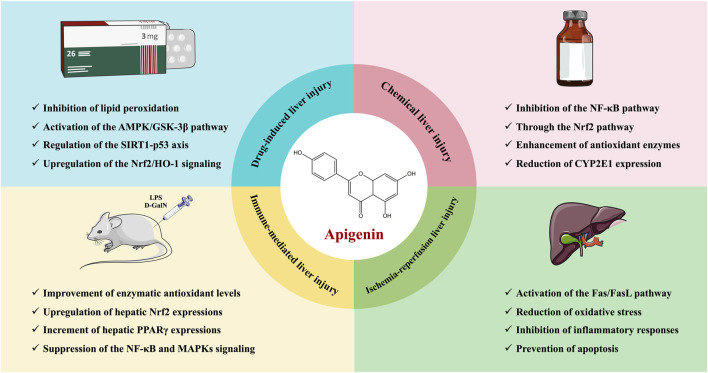Apigenin
-
There's just so many interesting studies on apigenin, I just had to make a thread on it.
- It seems to agonize 5ht-1a , which isn't necessarily a bad thing. 5HT-la is the serotonin au toreceptor, its activation leads to less serotonin.
"In vivo administration, spinally or systematically, of the 5-HT1A antagonist WAY-100635 inhibited the apigenin-induced antiallodynia and antihyperalgesia. In vitro, apigenin acted as a positive allosteric modulator to increase the efficacy (stimulation of [35 S]GTPγS binding) of the 5-HT1A agonist 8-OH-DPAT."
https://pubmed.ncbi.nlm.nih.gov/34030210/2.Here it shows binding affinity to 5HT-1a +2a. I suspect it antagonizes SHT 2
"The binding affinity estimations identified the superior interacting capacity of apigenin over safranal for 5HT1A/5HT2A receptors over 200 ns MD simulations. Both compounds exhibit oral bioavailability and absorbance. In the rodent model, there was a significant increase in the overall mobility time in the FST, while in the EPMT, there was a decrease in latency and an increase in the number of entries for the treated and HC rats compared with the DC rats, suggesting a reduction in depressive/anxiety symptoms after treatment."
https://pubmed.ncbi.nlm.nih.gov/36557792/It lowers mTor making it good for... well basically everything. Especially anti-aging or if you want to enhance the effect of a low protein diet or weaken the damage of a high protein diet
"...the levels of mammalian target of rapamycin (mTOR) were increased in chronic restraint stress mice and inhibited by apigenin. "
.://pubmed.ncbi.nlm.nih.gov/29902617/ -
It seems to activate Dopamine D2 receptors.
"Furthermore, intraperitoneal administration of haloperidol (0.2 mg/kg), a dopamine D(2) antagonist, blocked the apigenin (25 mg/kg)-induced decrease in immobility in the forced swimming test. These behavioral and biochemical results indicate the antidepressant properties of apigenin, which may be mediated by the dopaminergic mechanisms in the mouse brain."
-
It seems to inhibit MAO- A more than B, which could lead to some problems for Some people, so that's something to keep in mind. I wouldn't say that the overall effect of apigenin is serotonergic, given its effect on dopamine and Serotonin Receptors.
"Inhibition of MAO-A by galangin was about 36 times more selective than MAO-B, while apigenin selectivity for MAO-A vs. MAO-B was about 1.7fold. "
https://pubmed.ncbi.nlm.nih.gov/25412041/ -
It inhibits carbonic anhydrase, leading to higher CO2 retention.
"Apigenin and eriocitrin were identified as new potent inhibitors of human carbonic anhydrase VA isozyme."
https://pubmed.ncbi.nlm.nih.gov/25590364/ -
It protects against cholestasis.
MoA: FXR modulation, TLR-4 inhibition,anti-oxidanthttps://pubmed.ncbi.nlm.nih.gov/33620063/
Another study which also shows anti-fibrotic, anti cholestatic effects
https://pmc.ncbi.nlm.nih.gov/articles/PMC10967634/ -
Apigenin Prevents Acetaminophen-Induced Liver Injury by Activating the SIRT1 Pathway
-
Apigenin restores endothelial function by ameliorating oxidative stress, reverses aortic stiffening, and mitigates vascular inflammation with aging
https://pubmed.ncbi.nlm.nih.gov/34114892/ -
apigenin
Api activates BKCa and SKCa, leading to cell hyperpolarization that is followed by an influx of extracellular Ca2+; together with the release of Ca2+ from the ER, this rise in [Ca2+]i directly activates NOS; and the increased NO synthesis is then responsible for the inhibition of angiogenic endothelial cell functions by blocking Akt phosphorylation.
https://doi.org/10.1111/j.1538-7836.2007.02615.xNitric Oxide Induces Metabolic Shift from Glycolysis
"Nitric oxide, even in the presence of oxygen, causes a metabolic shift to glycolysis, wastefully producing lactate from glucose" RP -
apigenin
Api activates BKCa and SKCa, leading to cell hyperpolarization that is followed by an influx of extracellular Ca2+; together with the release of Ca2+ from the ER, this rise in [Ca2+]i directly activates NOS; and the increased NO synthesis is then responsible for the inhibition of angiogenic endothelial cell functions by blocking Akt phosphorylation.
https://doi.org/10.1111/j.1538-7836.2007.02615.xNitric Oxide Induces Metabolic Shift from Glycolysis
"Nitric oxide, even in the presence of oxygen, causes a metabolic shift to glycolysis, wastefully producing lactate from glucose" RPYou're over focusing on one point from an in-vitro study, when in fact apigerin has been shown to do the opposite of what you suspect (inducing glycolisis).
-
@Mauritio
It was just to mention that nothing is only white or black.
I give one example: Quercetin is well-known to have positive effects on a lot of markers. But it has also an impact on NO2. Must be taken into account. It doesn't diminish the other noticeable advantages. -
It really isn't even a matter of "black or white," but the lack of distinction. It is meaningless to throw around NOS without knowing what type in what context. Apigenin can increase eNOS and improve circulation. In a inflammatory context, it can inhibit iNOS, which is what we need to keep in check ultimately.
-
@bio3nergetic said in Apigenin:
Apigenin can increase eNOS and improve circulation. In a inflammatory context, it can inhibit iNOS, which is what we need to keep in check ultimately.
Yes, you're right. Well seen.
The priority is then to lower inflammation and to improve circulation. The target with NO2 is desired in this case. -
@bio3nergetic said in Apigenin:
It really isn't even a matter of "black or white," but the lack of distinction. It is meaningless to throw around NOS without knowing what type in what context. Apigenin can increase eNOS and improve circulation. In a inflammatory context, it can inhibit iNOS, which is what we need to keep in check ultimately.
Yes, well said. It's the bigger picture that matters.
-
This article appeared in my inbox. More support for apigenin protecting the liver.
Apigenin as an emerging hepatoprotective agent: current status and future perspectives (2024)

-
-
Apigenin inhibits xanthine oxidase so it can raise atp and lower uric acid.